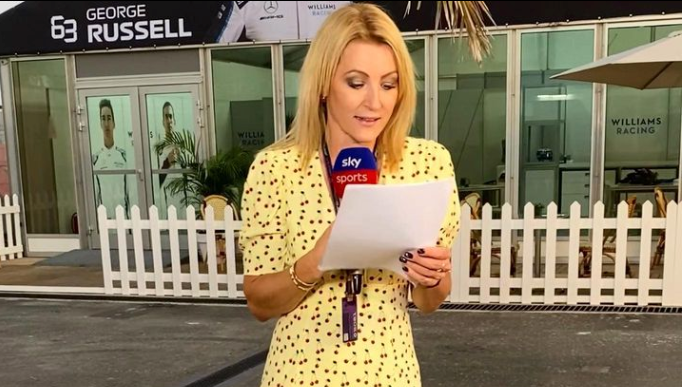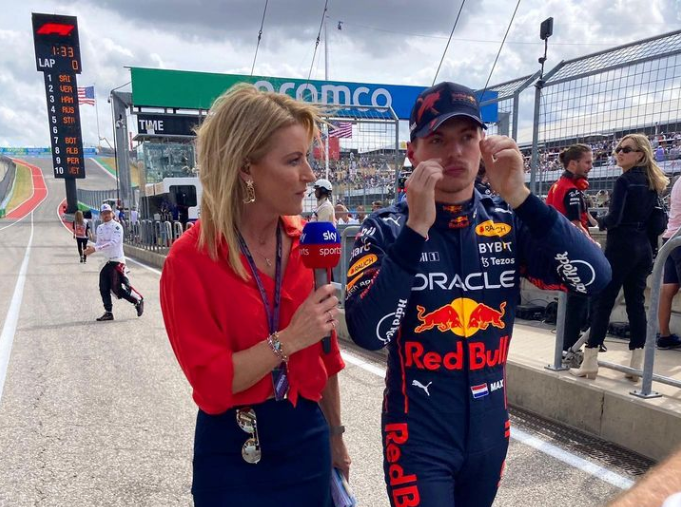Rachel Brookes: Sky F1 presenter on life in the paddock and a run-in with Bernie Ecclestone
A familiar face and voice for fans in the UK, Rachel Brookes tells Kieran Jackson about how Formula 1 is creating more pathways for women and the difference between interviewing Lewis Hamilton and Max Verstappen


A report published last week by Females in Motorsport revealed women spoke for just 1.54 per cent of the run time in the new season of Drive to Survive on Netflix, totalling six minutes and seven seconds out of more than six-and-a-half hours. Curious, too, when you consider the emphasis throughout Formula 1 on increasing opportunities and visibility for women, despite a woman not competing in the sport since 1976.
Yet look in the paddock or on your screens and women are present. Not enough yet, as Drive to Survive’s inadequate representation infers, but they’re in attendance. Rachel Brookes, heading into her 12th year as a reporter and presenter for Sky Sports F1, is one such face, refreshingly familiar for all UK fans of the sport.
Swapping duties with Natalie Pinkham and Simon Lazenby, the 48-year-old is a well-respected and trusted voice not just for the viewers at home, but for the drivers in the paddock too. This year, she will be at 19 out of a record 23 races, starting with Saudi Arabia next week. Speaking with passion about a job she adores, Brookes is insistent that F1 is improving when it comes to female representation.
“I have seen it change – there’s a lot more women now working in all sports as well as Formula 1,” she says.
“It’s been really positive. One of the first things Sky did was send me out to cover cricket, they’d never had a women on the boundary edge before doing live match updates but I loved it.
“I haven’t seen any barriers in F1. I think the audience sometimes has a more negative view and you have to actually persuade them that you’re there for the right reasons and on merit.
“We’ve been seen as such an elitist sport in the past because of all the money, people didn’t think they could buy into it – but they do now and that’s brilliant.”
Her time in front of the camera – and behind the mic – has brought her a thrill and moments unlike anything she could’ve possibly foreseen when she jumped on the bandwagon of Sky winning the rights to F1 for 2012. From going out to lunch with Sergio Perez and his family at the Mexican’s favourite ice cream vendor to speaking to Lewis Hamilton after six of his seven world titles, the buzz of discovering the story behind the story still runs raw.
Mind you, for every personal high comes the antithesis. A moment which often sticks out more prominently. China, 2012, and Brookes’ first F1 race with Sky.
“I remember my ‘have I ruined everything moment’ very clearly,” she tells. “I was doorstepping Bernie Ecclestone outside a meeting with all the team principals about Bahrain, and whether we’d go and race there with all the protests.
“He was chatty and then I asked ‘are you going to Bahrain?’ and he stopped in his tracks and he just said ‘what a stupid question’. The rest of the day, people were telling me that I needed to check if my pass still works! It was my first race and I thought I’d blown it.

“It was classic Bernie. He said to Martin Brundle ‘who’s that girl?’ But my pass worked, he did go to Bahrain and it’s been great ever since.”
Learning on the job is one key facet; an element even more relevant now as Brookes takes to the commentary box regularly to preside over practice sessions on race weekends.
Having a role which is three-fold – presenter, interviewer, commentator – presents a number of challenges and may well explain her sizeable notebook, containing qualifying and race results for every grand prix in the last 11 years. Watch out, Ted.
Though with that responsibility comes pressure and scrutiny. Sometimes it evolves into something altogether more sinister and, at worse, abuse online. Yet Brookes has two features she plies her trade by: listen and take the good with the bad.
“I’ve got to know the drivers and their personalities pretty well now,” she says. “Sometimes, Max Verstappen can give one-word answers so you’ve got to keep pushing whereas if Lewis gives a one-word answer, let him go because he’s not going to change. But they both know me well enough now that they know I have to push them sometimes.
“But we’ve all seen things online which haven’t been very pleasant. I tend to think if you believe the good you have to believe the bad, so I’d rather not believe any of it. It’s easier just to draw a line through it and say it’s fine, everyone is entitled to an opinion.
“Abuse we don’t stand for and it’s not welcome in Formula 1. I’ve definitely seen a divide recently among the fans but if I’m getting 50/50 then I’m probably doing my job right.
“I don’t have notifications on for Twitter so sometimes after a race I’ll wait a few days. But also I’m always willing to learn and if someone genuinely has a point, I’ll take it on board.”

Brookes’ words come just one week after the FIA released a white paper focused on a six-point plan to combat online hate in motorsports. With F1’s surge in popularity has come a certain sense of vitriolic tribalism, most visibly played out on social media.
Yet both F1 and the FIA continue – in contrast with general rumblings in the off-season – to sing from the same hymnsheet in this department. F1 is this year launching its first all-female racing series, with the target of producing role models who can go on to compete in Formula 3 and beyond. Alpine have announced the Rac(H)er programme to increase the number of women at their F1 team.
Moves are being made. Progress is being targeted. Female interest and involvement is on the up.
“There are women chomping at the bit to get into F1 now more than ever,” Brookes says. “I’ve got cousins, girls in their 20s, asking me about the drivers and girls messaging me about how to get into it.
“We definitely all get recognised a bit more, whether it be the airport or Marks & Spencer. So you feel more of a responsibility now and I’d love to help someone else get into the sport.
“I’d love for somebody who messaged me early on for advice to get a chance.”
Watch all 23 races of the 2023 F1 season exclusively live on Sky Sports F1 and NOW
Join our commenting forum
Join thought-provoking conversations, follow other Independent readers and see their replies
Comments


Bookmark popover
Removed from bookmarks